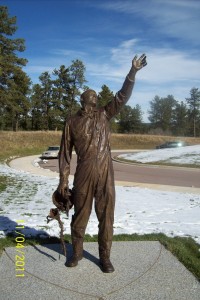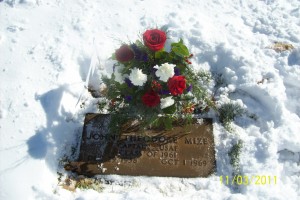
Those of you who know me, or who read my book, which is pretty much the same thing, know that today’s topic is inevitable.
Today is October 1st. Long a bad luck day in our family.
So, for those who don’t know the story — judging by my sales for Wyoming Trucks, there are a lot of you — today is the touchstone for it.
Many years ago, before the turn of the century, back in ththere was a young woman who married an Air Force fighter pilot. There she is, posing on one of the planes.
A paragon of sixties loveliness.
After a few years — five years of fertility worries, actually, but that’s another story — a baby came along. Not a paragon of loveliness, but reasonably cute.
Alas, the story is a sad one. October 1, 1969 rolled around and my dad died when his fighter plane crashed, along with his wing man.
I’ve written about it before. How my mom and I found the field where they crashed, the trees still broken off halfway up, 25 years later.
Other things happened on other October 1sts throughout the years, some greater, some minor. None as significant as this one. But enough to keep us careful of it.
We‘re hoping that will change.
My stepsister-in-law, Alison, is checked into the hospital now, to have her first baby.
 There’s sorrow around this one, too. My stepbrother, Davey, lost his mother to cancer a few years back. And Alison’s mother is now fighting serious health problems.
There’s sorrow around this one, too. My stepbrother, Davey, lost his mother to cancer a few years back. And Alison’s mother is now fighting serious health problems.
My mom and Dave will head out to help with the new baby tomorrow. My mom will be playing grandmother for the duration.
We’re hoping the baby will be born sometime today.




